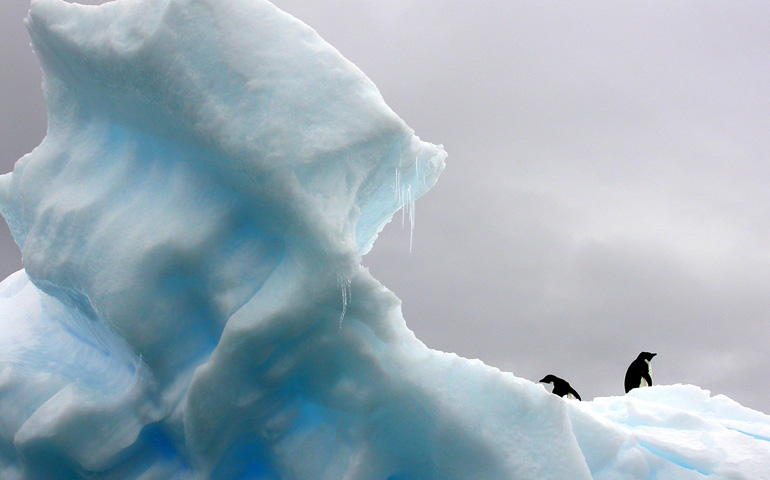
Unsplash/Teodor Bjerrang
In recent weeks, the United States withdrew from the Paris climate agreement and an iceberg the size of Delaware broke off from Antarctica. As one penguin said to another, "There goes the neighborhood."
Funny? Not.
Maybe everybody's summer reading should include Laudato Si', Pope Francis' 2015 encyclical letter "on Care for our Common Home."
That common home would be Earth.
Despite its annoying English translation — Earth is "she" rather than "it" — the recommendations of Laudato Si' could be enough for us to moderate the air conditioner, if not turn it off. Along with the document, we can recite both the causes and effects of environmental sins: "The violence present in our hearts, wounded by sin, is also reflected in the symptoms of sickness evident in the soil, in the water, in the air and in all forms of life."
We know about the problems, yet daily we collaborate in the ruination of the planet. Our highly mobile throwaway culture needs more heating and cooling than ever before. We want the newest, latest, brightest and best thing on the market. We want to move faster and farther in more comfort, by land, sea and air. We want what we want and we want it now.
Fossil fuels, fertilizers and fracking damage the planet. Greenhouse gasses damage the planet. Oil spills and waste runoff damage the planet. Yet not enough is happening to change the trajectory of the end game we are so dangerously playing.
Even so, the world's leaders seem to be getting it — 195 countries signed on to the Paris Agreement. The signers included China, India and the United States, which collectively produce as much as half of the world's greenhouse gas emissions. While President Trump famously withdrew from the agreement, that cannot take effect for some time. The United States' prior ratification stands until Nov. 4, 2020, one day after the next presidential Election Day. Things might be different then.
Also, by then three non-signers, Nicaragua, Syria, and the Holy See, might find ways to sign on. Nicaragua said it would go it alone, complaining about no punishment mechanism for offenders; Syria's warfare got in the way; and, in 2015, the Holy See said it would sign after it becomes a member of the United Nations Framework Convention on Climate Change. That has not happened. It takes a while for things to get from the Vatican in Rome to the Holy See Mission to the United Nations in New York. The Paris Agreement closed for signature on April 21, 2017.
The real reasons behind the United States' withdrawal from the agreement is anybody's guess. The agreement is aimed at limiting global warming and these months in the Northern Hemisphere might encourage folks — especially those who live in Washington, D.C. — to truly believe Earth's temperature is rising, weather systems are changing, and dirty air is not very conducive to healthy life of any kind.
Meanwhile, beyond the D.C. Beltway, in Antarctica, the ice shelf called "Larsen C" plunked a trillion tons of ice into the ever-warmer Southern Ocean. The newly named iceberg "A-68," about 2,300 square miles big, is floating north.
Did one thing cause the other? Did global warming cause a shrinking polar ice cap? And, after all, who cares? Scientists say it will take another 80 or 90 years for the seas to rise three feet.
Hello? Three feet. That means most coastal settlements will disappear by the end of the century. And, excluding the residents of exclusive beach front communities in affluent nations, the most seriously impacted persons will be the poor who depend on ocean waters for food, climate control and transport.
We can talk all we want about solar panels and rain barrels, but the fact is that most of the developed world is doing little or nothing to help Earth recover from its injuries. Unless we bring about real initiatives, unless we invest in robust plans to cool and clean the planet, we risk the kind of destruction American writer Cormac McCarthy warned about in The Road. And the destruction, the devastation, will begin — is already beginning — for the least members of the human family.
The day he was elected, Pope Francis sat next to Franciscan Cardinal Cláudio Hummes, who leaned over and said "do not forget the poor." He has not. Have we?
[Phyllis Zagano is senior research associate-in-residence at Hofstra University in Hempstead, N.Y. Her books include Women Deacons: Past, Present, Future and Women Deacons? Essays with Answers.]
Editor's note: We can send you an email alert every time Phyllis Zagano's column, Just Catholic, is posted. Go to this page and follow directions: Email alert sign-up.



